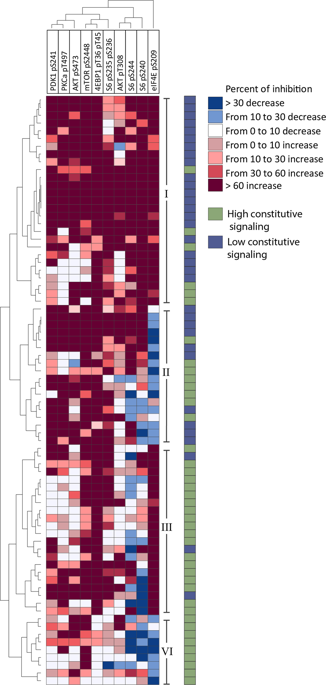Signal Transduction and Targeted Therapy ( IF 39.3 ) Pub Date : 2019-06-19 , DOI: 10.1038/s41392-019-0050-0 Ina Nepstad 1 , Kimberley Joanne Hatfield 1, 2 , Ida Sofie Grønningsæter 1 , Elise Aasebø 1, 3 , Maria Hernandez-Valladares 1, 3 , Karen Marie Hagen 1 , Kristin Paulsen Rye 1 , Frode S Berven 3 , Frode Selheim 3 , Håkon Reikvam 1, 4 , Øystein Bruserud 1, 4

|
The phosphatidylinositol 3-kinase (PI3K)-Akt-mechanistic target of rapamycin (mTOR) pathway is constitutively activated in human acute myeloid leukemia (AML) cells and is regarded as a possible therapeutic target. Insulin is an agonist of this pathway and a growth factor for AML cells. We characterized the effect of insulin on the phosphorylation of 10 mediators in the main track of the PI3K-Akt-mTOR pathway in AML cells from 76 consecutive patients. The overall results showed that insulin significantly increased the phosphorylation of all investigated mediators. However, insulin effects on the pathway activation profile varied among patients, and increased phosphorylation in all mediators was observed only in a minority of patients; in other patients, insulin had divergent effects. Global gene expression profiling and proteomic/phosphoproteomic comparisons suggested that AML cells from these two patient subsets differed with regard to AML cell differentiation, transcriptional regulation, RNA metabolism, and cellular metabolism. Strong insulin-induced phosphorylation was associated with weakened antiproliferative effects of metabolic inhibitors. PI3K, Akt, and mTOR inhibitors also caused divergent effects on the overall pathway phosphorylation profile in the presence of insulin, although PI3K and Akt inhibition caused a general reduction in Akt pT308 and 4EBP1 pT36/pT45 phosphorylation. For Akt inhibition, the phosphorylation of upstream mediators was generally increased or unaltered. In contrast, mTOR inhibition reduced mTOR pS2448 and S6 pS244 phosphorylation but increased Akt pT308 phosphorylation. In conclusion, the effects of both insulin and PI3K-Akt-mTOR inhibitors differ between AML patient subsets, and differences in insulin responsiveness are associated with differential susceptibility to metabolic targeting.
中文翻译:

胰岛素和通路抑制剂对急性髓系白血病细胞 PI3K-Akt-mTOR 磷酸化谱的影响。
磷脂酰肌醇 3-激酶 (PI3K)-Akt-雷帕霉素靶点 (mTOR) 通路在人急性髓系白血病 (AML) 细胞中被组成型激活,被视为可能的治疗靶点。胰岛素是该途径的激动剂,也是 AML 细胞的生长因子。我们在 76 名连续患者的 AML 细胞中描述了胰岛素对 PI3K-Akt-mTOR 通路主通路中 10 种介质磷酸化的影响。总体结果表明,胰岛素显着增加了所有研究介质的磷酸化。然而,胰岛素对通路激活谱的影响因患者而异,并且仅在少数患者中观察到所有介质的磷酸化增加;在其他患者中,胰岛素有不同的作用。整体基因表达谱和蛋白质组/磷酸化蛋白质组比较表明,这两个患者亚群的 AML 细胞在 AML 细胞分化、转录调控、RNA 代谢和细胞代谢方面存在差异。胰岛素诱导的强烈磷酸化与代谢抑制剂的抗增殖作用减弱有关。尽管 PI3K 和 Akt 抑制导致 Akt pT308 和 4EBP1 pT36/pT45 磷酸化普遍降低,但在胰岛素存在的情况下,PI3K、Akt 和 mTOR 抑制剂也会对整个通路磷酸化谱产生不同的影响。对于 Akt 抑制,上游介质的磷酸化通常增加或不变。相反,mTOR 抑制降低了 mTOR pS2448 和 S6 pS244 磷酸化,但增加了 Akt pT308 磷酸化。总之,胰岛素和 PI3K-Akt-mTOR 抑制剂的作用在 AML 患者亚群之间存在差异,并且胰岛素反应性的差异与代谢靶向的不同易感性相关。



























 京公网安备 11010802027423号
京公网安备 11010802027423号